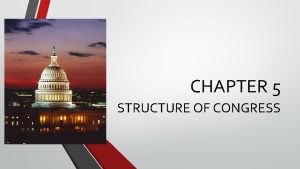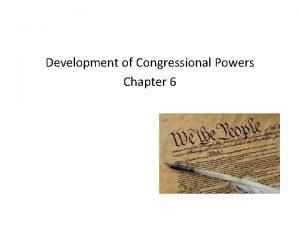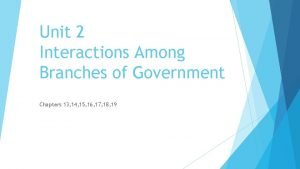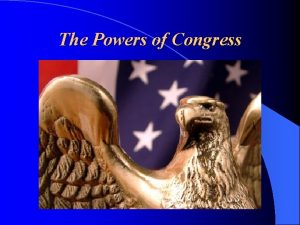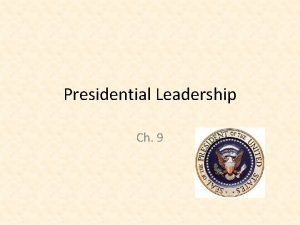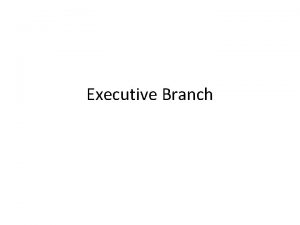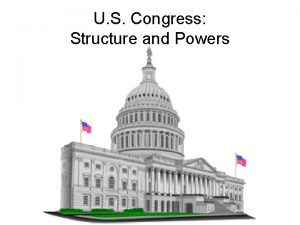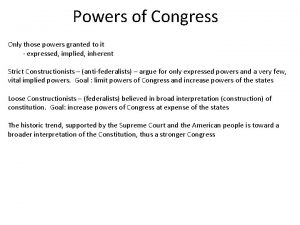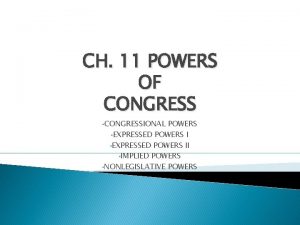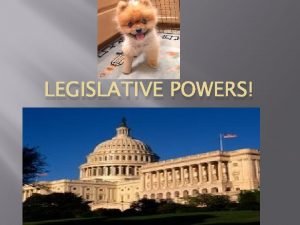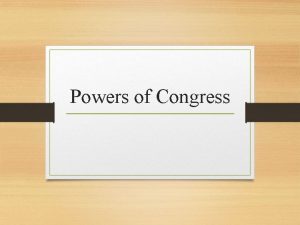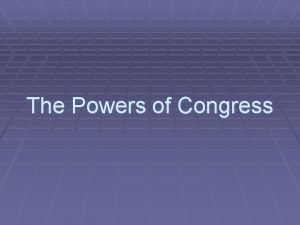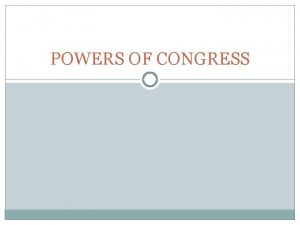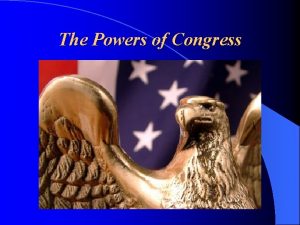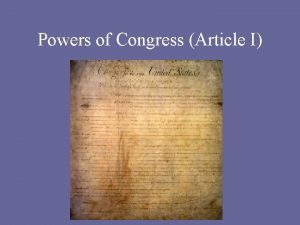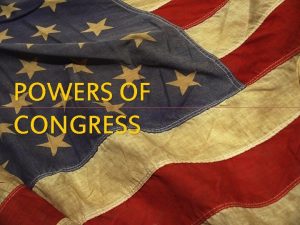CONGRESSIONAL POWERS Congressional Power Congress ONLY has those
















- Slides: 16

CONGRESSIONAL POWERS

Congressional Power � � Congress ONLY has those powers “delegated” to it by the Constitution Three different types: � 1) expressed powers – those specifically written in the Constitution. � 2) implied powers – those that are “suggested” by the expressed powers (necessary and proper) � 3) inherent powers – those that exist because most governments have them

Strict Construction vs. Loose Construction � Strict Construction � Supported by Jefferson � Insisted that Congress ONLY be able to exercise its 1) expressed powers 2) implied powers ABSOLUTELY NECESSARY to carry out the expressed powers � Did not want the national/federal government to be too strong

� Loose Construction � Led by Hamilton � Believed in a broad interpretation of the powers of Congress � Wanted a strong, powerful national/federal government � They got their way and the national government has interpreted the powers of Congress “loosely” ever since

� Several factors, along with a loose interpretation of the Constitution, are responsible for the increase in national power: � War � Economic crises � Huge advances in transportation & communication � Demands from the people for more government services

Power to Tax � The Constitution gives Congress the power to: � Impose and collect taxes to pay US debts, provide for defense and general welfare Congress takes in trillions every year 90% of it comes from taxes Taxes include tariffs, taxes on cigarettes, licensing fees, etc.

� Limitations on taxing: � 1) may tax only for public purposes, not private profit � 2) may not tax exports � 3) direct taxes must be apportioned among states according to population Direct tax – one paid directly to the government by the person on whom it is imposed �Wealth isn’t evenly distributed among the states �So this tax would hurt some states more than others �So there are no direct taxes on states

� 4) indirect taxes must be levied at the same rate in all parts of the country � Indirect tax – paid by one person, passed on to another, then to the government These include taxes on gas, alcohol and tobacco

Power to Borrow � � � Congress may borrow money with no restrictions Deficit financing – gov’t spends more than it takes in each year so it has to borrow to make up the difference Public debt – all of the money borrow by the gov’t and not yet repaid, plus interest � US debt is approximately $14. 9 trillion

Commerce Power � Commerce power = power of Congress to regulate foreign and interstate trade � Most important part of Constitution for building the US into a strong, united nation � Gibbon v. Ogden (1824) � Supreme Court decided that states could not regulate commerce, only the federal government could

� � Based on the expressed powers to tax and regulate commerce, Congress and the courts have built most all of the implied powers Most of what the gov’t passes today is based on these two powers.

� Limits on Congress’ use of its commerce power: � 1) cannot tax exports � 2) cannot favor the ports of one state over another state � 3) cannot require ships from one state enter port or pay taxes in another state. � 4) could not interfere with the slave trade until 1808

Currency Power � Congress has the right to “coin” money � The US has issued coins in gold, silver, and other metals � � In 1791 it gave the Bank of the US the right to issue paper money States may not issue their own money

Foreign Relations Power � � More power in this area than any other Congress shares power with the president States may not take part in foreign relations Congress has the power to make laws affecting defense, immigration, terrorism, etc.

War Powers � Congress shares power with president � He � � is the “commander-in-chief” Only Congress can declare war, raise and fund armies, maintain a navy Congress makes rules concerning capture on land sea

Postal Power � Congress has power to create a post office and postal routes (including RR, air, water) � Ben Franklin considered father of our postal system � Approximately 38, 000 post offices in US � Federal crime to tamper with the mail � Cannot mail dangerous materials
 Lesson quiz 5-2 the structure of congress
Lesson quiz 5-2 the structure of congress The organization of congress chapter 5
The organization of congress chapter 5 Congressional powers
Congressional powers Development of congressional powers chapter 6 answer key
Development of congressional powers chapter 6 answer key Development of congressional powers chapter 6 answer key
Development of congressional powers chapter 6 answer key Congress formal and informal powers
Congress formal and informal powers Non legislative duties of congress
Non legislative duties of congress Informal powers of the president
Informal powers of the president Non legislative powers of congress
Non legislative powers of congress 4 powers of congress
4 powers of congress Congress informal powers
Congress informal powers Non legislative powers of congress
Non legislative powers of congress Implied powers examples
Implied powers examples What is a formal power of the president
What is a formal power of the president Congress informal powers
Congress informal powers 4 powers of congress
4 powers of congress Enumerated powers of congress
Enumerated powers of congress

